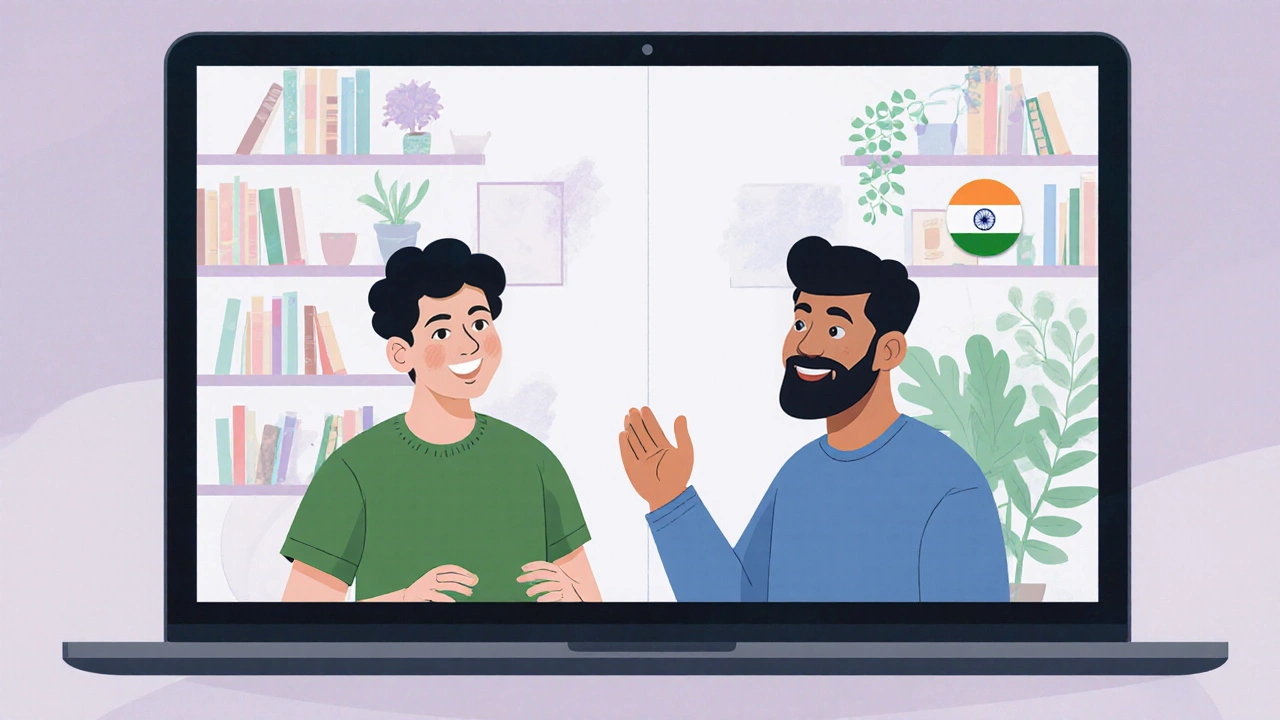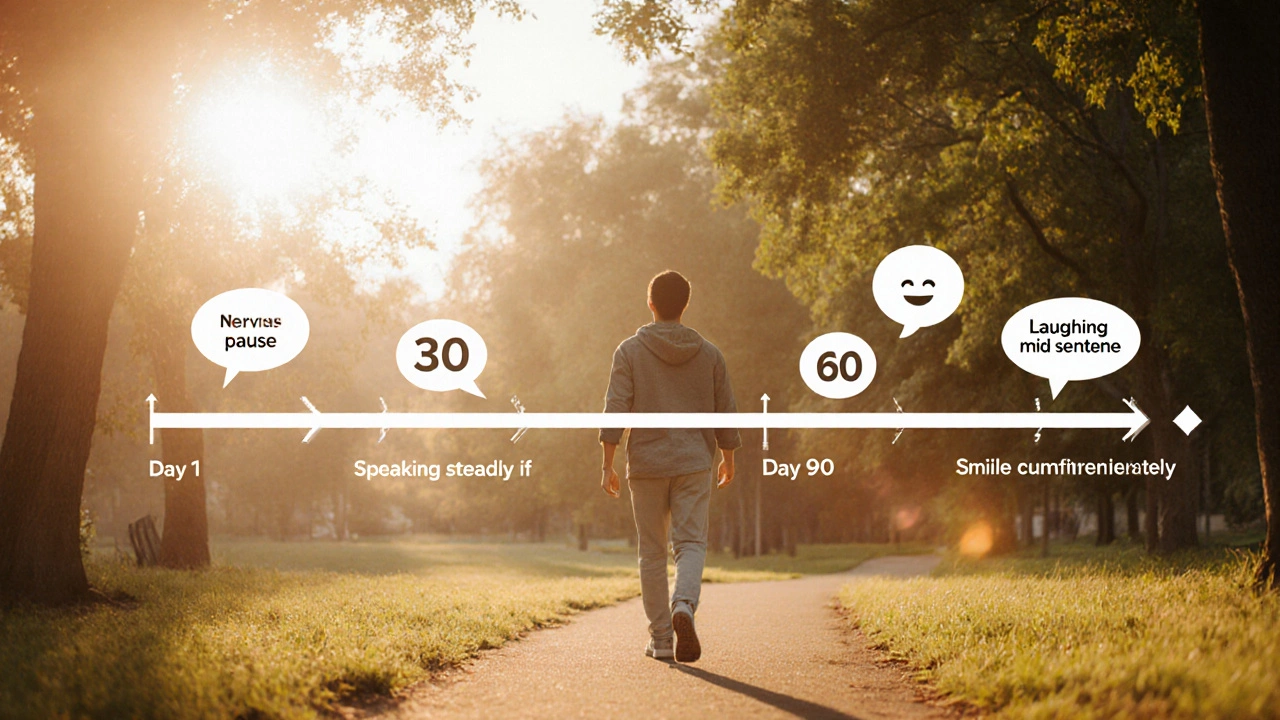Most people who learn English spend years studying grammar and vocabulary-but still freeze when someone asks them a simple question in real life. Why? Because fluency isn’t about knowing the rules. It’s about using the language without overthinking. If you want to speak English confidently and fluently, you need to change how you practice-not just how much you study.
Stop memorizing, start mimicking
Memorizing phrases like "I would like to book a hotel room" doesn’t help if you can’t say it naturally when you’re nervous. Real fluency comes from internalizing how native speakers actually talk. Listen to short clips from podcasts, YouTube videos, or TV shows. Pick one 30-second segment. Play it. Pause. Repeat it out loud. Match the rhythm, the pauses, the way words run together. Don’t worry about perfect pronunciation at first-focus on sounding like a person, not a textbook.
For example, native speakers don’t say "I am going to the store." They say "I’m gonna hit the store." Or "What are you doing?" becomes "Whatcha doin’?" These aren’t mistakes-they’re how English flows in real life. Mimic that. Your brain learns patterns faster than rules.
Speak even when you’re scared
Confidence doesn’t come before you speak. It comes after. Every time you open your mouth and get through a sentence-even if you stumble-you’re building muscle memory for fluency. The fear of making mistakes is the biggest blocker. But here’s the truth: most people don’t notice your errors. They notice if you sound unsure.
Start small. Talk to yourself in the mirror. Describe what you’re doing: "I’m making coffee. The kettle’s boiling. It smells like cinnamon." Then move to talking to a pet, a plant, or a recording app on your phone. Say your thoughts out loud. Don’t edit them. Don’t pause to correct yourself. Just keep going. After a week, you’ll notice your sentences get longer. Your voice gets steadier. That’s confidence forming.
Use the 80/20 rule for vocabulary
You don’t need to know 10,000 words to speak fluently. Studies show that 80% of everyday English conversation uses just 2,000 words. Focus on high-frequency phrases: "I think…", "Can you help me with…?", "What do you mean by…?", "That makes sense", "I’m not sure, but…". Learn these in chunks, not single words.
Instead of memorizing "interesting," learn: "That’s really interesting-tell me more." Instead of "happy," learn: "I’m so glad we could meet up." These are ready-to-use blocks. When you need to respond, you’re not translating. You’re pulling from memory. That’s what fluent speakers do.

Practice listening like you’re in a conversation
Listening isn’t passive. If you’re waiting for your turn to speak while someone else is talking, you’re not really listening. Active listening means paying attention to how they structure their thoughts, where they pause, how they react.
Try this: watch a 5-minute video with subtitles. Turn off the sound. Watch the speaker’s mouth. Notice how their lips move for "th" sounds, how their jaw drops for "ah" sounds. Then play it again with sound. Now you’re training your ears AND your mouth at the same time. This builds muscle memory for pronunciation without drills.
Also, don’t just listen to slow, clear English. Listen to real conversations-people talking over each other, interrupting, laughing mid-sentence. That’s what real fluency sounds like. If you only listen to clean, textbook audio, you’ll be lost in a real chat.
Find your speaking partner (not a teacher)
Language exchange is the most underrated tool. Find someone who wants to learn your native language, and you help them learn English. You don’t need to be perfect. You just need to show up. Apps like Tandem or HelloTalk connect you with people around the world. Set a 20-minute rule: 10 minutes in English, 10 minutes in their language.
Here’s what works: pick one topic per session-your weekend, your favorite food, a movie you saw. Stick to it. Don’t jump between topics. That forces you to reuse vocabulary and build natural responses. After a few weeks, you’ll notice you’re not searching for words anymore. You’re thinking in English.
Record yourself and listen back
It’s uncomfortable at first. You’ll hate the sound of your own voice. But that’s the point. You need to hear what you actually sound like-not what you think you sound like.
Record yourself answering one question: "What did you do yesterday?" or "Why do you like your job?" Play it back. Don’t judge. Just notice: Did you use filler words like "um" too much? Did you rush? Did you stop mid-sentence? Write down one thing to improve next time. Maybe it’s slowing down. Maybe it’s using a better transition word.
Do this once a week. In a month, you’ll hear progress. You’ll sound calmer. Clearer. More like yourself.

Think in English-no translations
The biggest barrier to fluency is translating in your head. You hear a question, you think in your native language, you translate, then you speak. That delay kills fluency.
Start small. Name things around you as you see them: "window," "cup," "phone." Then describe actions: "I’m opening the door," "The dog is barking." Gradually, build full thoughts: "I think it’s going to rain later because the sky is really dark."
When you’re stuck, don’t reach for a dictionary. Use simpler words. Say "big" instead of "enormous." Say "get" instead of "obtain." English doesn’t need fancy words to be powerful. It needs clarity.
Give yourself permission to be imperfect
Fluency isn’t about being perfect. It’s about being understood. Native speakers make mistakes all the time. They use wrong tenses. They forget words. They say "I seen it" instead of "I saw it." And no one stops them. They keep going.
If you wait until you’re perfect to speak, you’ll never speak. Progress happens in messy moments-not polished ones. The more you speak, the less you care about mistakes. And that’s when fluency clicks.
What happens when you stick with this for 90 days
Day 1: You’re nervous. You pause every 3 seconds.
Day 30: You can talk for a full minute without stopping. You use a few new phrases without thinking.
Day 60: You laugh during conversations. You interrupt politely. You ask follow-up questions.
Day 90: Someone says, "You speak English really well." And you realize-you didn’t study your way there. You practiced your way there.
Fluency isn’t a destination. It’s a habit. The more you use English in real, low-stakes ways, the more natural it becomes. You don’t need a course. You need consistency. And a little courage.
How long does it take to speak English fluently?
There’s no fixed timeline, but most people notice real progress in 3 to 6 months with daily practice. Fluency isn’t about mastering grammar-it’s about speaking without hesitation. If you speak for at least 15 minutes a day, listen actively, and stop translating in your head, you’ll see changes faster than you expect. It’s not about hours spent-it’s about how often you use the language in real situations.
Do I need to take an English course to become fluent?
No. Many people spend thousands on courses and still struggle to hold a conversation. What matters isn’t the course-it’s the practice. A course can give you structure, but fluency comes from speaking, listening, and making mistakes outside the classroom. Free resources like podcasts, YouTube channels, and language exchange apps can get you just as far-if not farther-than expensive programs.
Why do I understand English but can’t speak it?
This is super common. Understanding is passive. Speaking is active. You’ve trained your ear, but not your mouth. Your brain knows the words, but your tongue hasn’t learned the rhythm. The fix? Speak more-even if it’s just talking to yourself. Start repeating what you hear. Record yourself. Don’t wait for perfect pronunciation. Just get your mouth used to forming English sounds in real time.
How can I improve my English pronunciation?
Focus on sounds that don’t exist in your native language. For example, the English "th" sound (as in "think") or the difference between "l" and "r." Watch videos of native speakers’ mouths. Use free tools like YouGlish to hear how a word is pronounced in real sentences. Don’t aim for a perfect accent-aim for clarity. If people understand you, your accent doesn’t matter.
What should I do if I blank during a conversation?
It happens to everyone. Instead of panicking, use filler phrases that buy you time: "Let me think for a second," "That’s a good question," or "I’m not sure how to say it, but…" Then try to rephrase in simpler words. The goal isn’t to sound smart-it’s to keep the conversation going. Most people won’t notice your pause. They’ll notice if you shut down.
Is it better to practice with native speakers or other learners?
Both help. Native speakers give you real-life input and correct natural usage. Other learners help you feel less alone-you’re both figuring it out. Start with other learners if you’re nervous. Once you’re comfortable, push yourself to talk with native speakers. The key is consistency, not perfection. Even a 10-minute chat once a week makes a difference.

